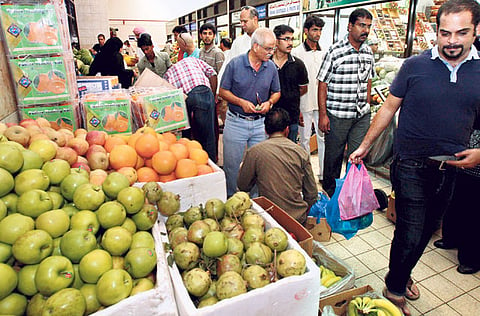Fruit and vegetables missing from daily diet, survey finds
More than half of Dubai residents don't consume enough fruits and vegetables to keep them healthy

Dubai: You know that a healthy serving of fruits and vegetables is good for a person's health, but does this requirement reflect the health of a city?
Apparently not, according to a Dubai Health Authority (DHA) survey released yesterday on fruit and vegetable consumption among the population of Dubai, stating that more than half of Dubai residents (59 per cent) do not consume enough to keep themselves healthy.
The survey, jointly conducted with the Dubai Statistics Centre, aimed to gauge the current daily intake and use the findings to tailor public health and awareness policies, and urge stakeholders — the public, private health sector, employees and schools to promote the regular consumption of fruits and vegetables.
Laila Al Jasmi, CEO of Health Policy and Strategy Sector at the DHA said: "The study establishes a direct link between education and consumption of fruits and vegetables, and thus points out the need to raise overall awareness in the society through awareness initiatives."
Reaching society
Laila highlighted that the consumption details are based on age, gender, income, education and nationality. "These findings provide us valuable data so that we can base our public health policies in a manner that allows us to reach out to the segment of society that most requires it," she said.
Dr Amnah Mattar Al Marashdah, senior research specialist at the DHA Health Policy and Strategy Sector, added: "Respondents were asked how many servings of fruits and vegetables they eat on a typical day. The data obtained was used to construct an indicator of sufficient fruit and vegetable consumption for reducing health risks — based on consultation with the World Health Organisation (WHO) and UN Food and Agriculture Organisation [FAO]."
Given the prevalence of lifestyle-related diseases in the UAE, Nael Sahhar, Head of Internal Medicine at Oasis Hospital, Al Ain, reiterated the benefits of a diet rich in fruit and vegetables.
Disease prevention
He told Gulf News it was a necessary approach in disease prevention. "Many of my obese and diabetic patients wouldn't be suffering had they taken better care of their diet. It has been medically proven that a good intake of fruit and vegetables is the foundation of a healthy diet. The nutritional benefits like vitamins and antioxidants help prevent lifestyle diseases such as cardiovascular, diabetes, obesity, and different kinds of cancer. An unhealthy diet puts a person at risk. Eating a minimum of five servings, recommended by health care institutions a day protects people from a host of diseases."
He attributed unhealthy diets to an overdependence on fast food and readily packaged consumables as well as advertising that focuses on unhealthy options. "People opt for sugar and fat rich food instead of healthy options. In addition, advertisers focus on making unhealthy food appealing. In general people are addicted to the taste of foods high in sugar and fat."
Nutritionist's view
Kathleen Farren, a nutritionist and weight-loss specialist in Dubai spoke to Gulf News about patient attitude to fruit and vegetable consumption.
“People have different levels of knowledge. There are people who know about it and take the effort to include the recommended servings in their diets. There are also people who categorically say they don’t like eating fruit and vegetable.”
Farren explained that nutritionists play in integral role in educating people on healthy diets and providing alternatives.
She said, “If someone eats only bananas or grapes, I need to open their minds to more varieties of fruit so they can get a full benefit of a range of vitamins and minerals. My advice is to fill half your plate with vegetables during lunch and dinner and consume fruit at breakfast and a snack to ensure sufficient intake”.


